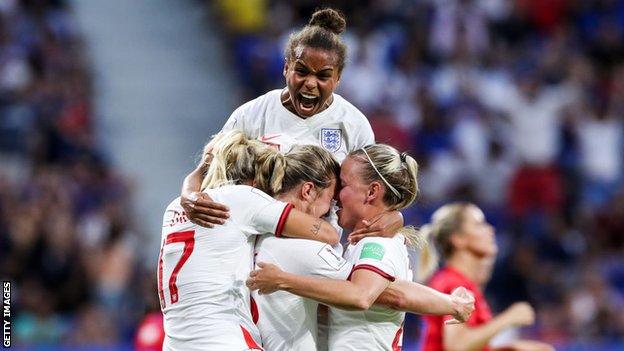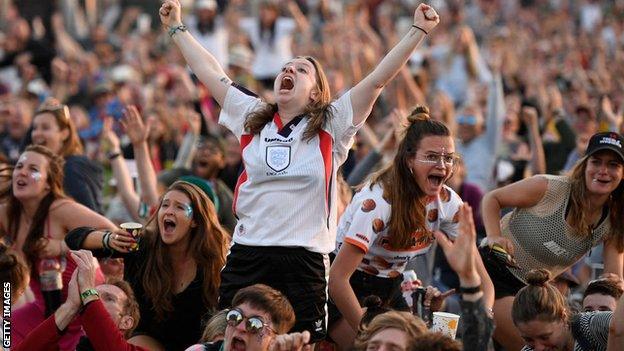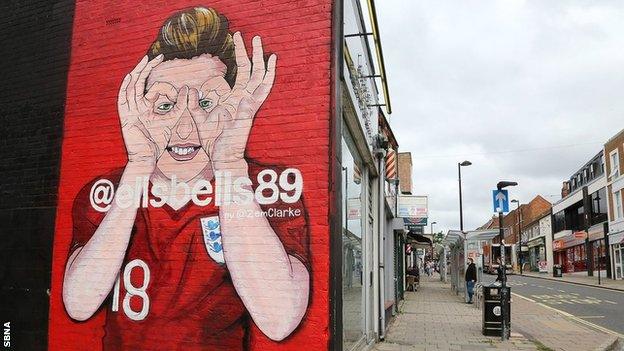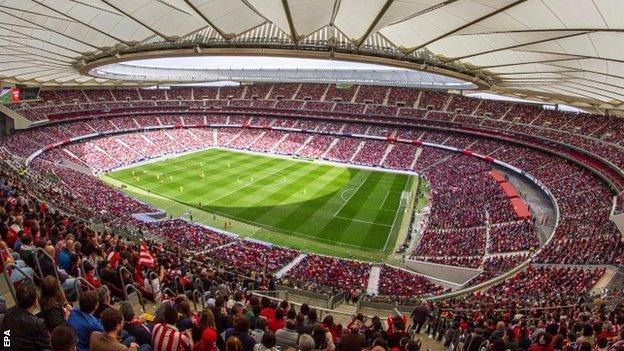What has the World Cup done for women's football and how can it capitalise?
- Published

England reached the World Cup semi-finals and have qualified a British team for the 2020 Olympics
England failed to achieve their target of winning the World Cup after a semi-final defeat by the United States but the impact they have made on the British public has surpassed expectation.
Prior to the tournament, the record UK TV audience for a women's football match was four million, but that mark has been broken four times in France, culminating in a peak of 11.7 million for the loss to the world's number one team last Tuesday.
Phil Neville's team are eager to forge a path for future generations and Chelsea boss Emma Hayes says their run has ensured a "sizable shift" in the perception of women's football.
The potential to make further gains is enormous, particularly since the Lionesses' fourth-placed finish ensured there will be a Great Britain football team at the 2020 Olympics, before Euro 2021 is staged in England.
But is women's football able to capitalise and bring an increased level of attention to the domestic game?

England's quarter-final against Norway was shown at Glastonbury
How the landscape changed at the 2019 World Cup
It's not only in England where TV audiences have boomed during the World Cup.
Despite poor attendances at the games, TV records have been broken across the globe, including in France, the United States, Germany and China.
Almost 59 million people watched Brazil's last-16 game against the hosts, making it the most-watched women's football match of all time.
Unprecedented levels of media coverage have helped draw in new fans; 62 countries held TV rights to broadcast the tournament compared with 37 in 2015; dozens of members of the British media have been in France, far more than were in Canada four years ago.
"This World Cup has felt different," Hayes told 5 Live's Football Daily podcast. "We've grown up in a country where women's football has been kept to one side, and it hasn't been a part of the masses and it hasn't dominated numbers in terms of audience figures and press coverage. The interest now is above and beyond what we've ever seen."
Who knows how much those numbers would have grown had England made it to the final, or even won their first tournament?
It may feel like a missed opportunity in that regard, but with the 2020 Olympics and Euros on the horizon the international game looks as if will be in good health.
Translating that to the domestic game is the big challenge, but the Football Association says it has been planning for this moment.
"We knew that the World Cup was going to be big," said Marzena Bogdanowicz, the FA's head of commercial and marketing for women's football. "Unlike in 2015 [in Canada], this World Cup has been in the same time zone as England and at Euro 2017, we already started to see and feel something different.
"We have been talking about a tipping point since last November. There was a wave coming and we knew we had to be ready."

During the World Cup, a mural of England striker Ellen White in her "goggles" celebration pose was painted at the end of Aylesbury's High Street
Is women's football ready to capitalise?
The problem in the past is that once the euphoria of a major tournament has died down, people return to their normal habits and almost forget that women's football exists on a domestic level.
In 2015, after England finished third, there was an initial bounce in domestic attendances, helped by a summer league that resumed a few weeks after the World Cup.
But there is now a wait until the Women's Super League winter season starts in September, by which time the Premier League campaign will have started, occupying the attention of many of the journalists who were out in France.
Yet for lots of reasons, women's football is already starting from a better place than four years ago.
Despite West Ham skipper Gilly Flaherty saying she still has to buy her own boots,, external there has never been more money in the game. Top players earn six-figure annual salaries and Barclays announced a £10m sponsorship deal for the WSL, which will kick in next season.
Major brands signed up players before the World Cup and even though the team did not fulfil their pledge to win the tournament, there is hope from agents that their clients' interest in the Lionesses will continue.
In addition, the WSL is now fully professional and news that the Premier League has moved a step closer to taking over the running of it only adds to the optimism.
From an international perspective, the FA has also learned lessons from 2015, when England did not play a home game until a European Championship qualifier almost five months later.
This time, in addition to a friendly game against Germany at Wembley in November, for which more than 30,000 tickets have already been sold, there are plans for another homecoming game in October.
"The challenge is always getting bums on seats," said England and Lyon midfielder Izzy Christiansen, who moved to France from Manchester City in July 2018.
"They will only come back if they like what they see and if our aim is to increase the attendances, we as players have a responsibility to ensure we are fulfilling the terms of being professional female footballers.
"Imagine if every match had the level of intensity that we saw in the semi-final between England and the USA. That will increase the amount of people that come to watch."

The FA and WSL clubs are aiming to replicate big attendances achieved in other European leagues such as when Atletico Madrid played Barcelona in front of 60,739 fans
What are the challenges?
One of the biggest concerns at the FA is about making sure of reaching its lofty attendance targets as part of its four-year 'Gameplan for Growth' strategy.
While a visible World Cup campaign will have helped that cause, reaching an average of 2,020 fans per game in the WSL by 2021 looks ambitious.
The top-flight average for last season was 965, which is an improvement on the previous year but down on a peak of 1,135 achieved in the summer season of 2016. A winter switch two years ago saw crowds dip at most clubs bar the top three - Manchester City, Chelsea and Arsenal.
For a sport which traditionally attracts families, cold nights at out-of-town stadiums do not help, while clashes with Premier League fixtures present an additional challenge.
The FA says its attendance target is "big" but is now planning to make "big games bigger" as a way of increasing the average attendance at domestic games and is planning "double headers" with men's games next season.
Following on from huge attendances in other European women's leagues, talks are also taking place about hosting some of the opening Women's Super League games on 7 September at Premier League grounds.
The Etihad Stadium would be an ideal venue for the first Manchester derby in women's professional football, especially as the opening fixtures fall in a men's international window.
Hayes added: "If you improve the product, the rest will come. One of the biggest criticisms in England is you don't know when the games are."
But Bogdanowicz said: "We will have a major launch campaign for the new WSL season, starting in September, and we will be ready to rock and roll.
"Nearly all the Lionesses will be playing on your local doorstep, but we want the media to do more to make sure everyone signposts when and where they can watch.
"This is the key time."
What needs to happen next?
From a participation perspective, FA chief executive Martin Glenn says that plans to double the number of girls and women playing football by 2020 are "on track".
But he thinks a key driver for the women's game would be to see domestic games on terrestrial TV. Currently, WSL matches are on pay TV, streamed online by the BBC or on clubs' Facebook accounts.
Glenn told the BBC: "What will make the WSL more attractive is getting more exposure in the millions, so being on terrestrial TV, making sure games are played in men's stadiums and continuing to improve the quality of the football."
Hayes wants to see a regular slot for women's games on a week-by-week basis to help broadcasters, while Bogdanowicz says she wants to see women's football "normalised".
"One area which would be great is getting all the results from men's and women's matches together on TV," she says. "We want regular reportage, so that it's not isolated in the corner but side by side with men's football.
"If you look at what's been achieved already, we wanted to get the England players as household names, and I think some of them will be. We smashed the viewing figures and level of interest, we have changed perceptions and we have qualified a team for the Olympics.
"Yes, a World Cup win would have quadrupled all that we but we walk away with something we could never have dreamed of.
"We have shifted the dial and we are not stopping. We have the best opportunity ever and we are going to keep on smashing it."